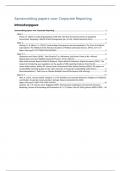Samenvatting
Summary of the papers for Corporate Reporting 2023
- Vak
- Instelling
In this summary the following papers/ chapters are summarized: Ghio, A. and R., Verona (2020). Chapters 1-3. The Evolution of Corporate Disclosure Insights on Traditional and Modern Corporate Communication, Springer Nature Switzerland AG 2020, Graham, J.R., C.R. Harvey and S. Rajgopal (2005). Th...
[Meer zien]



